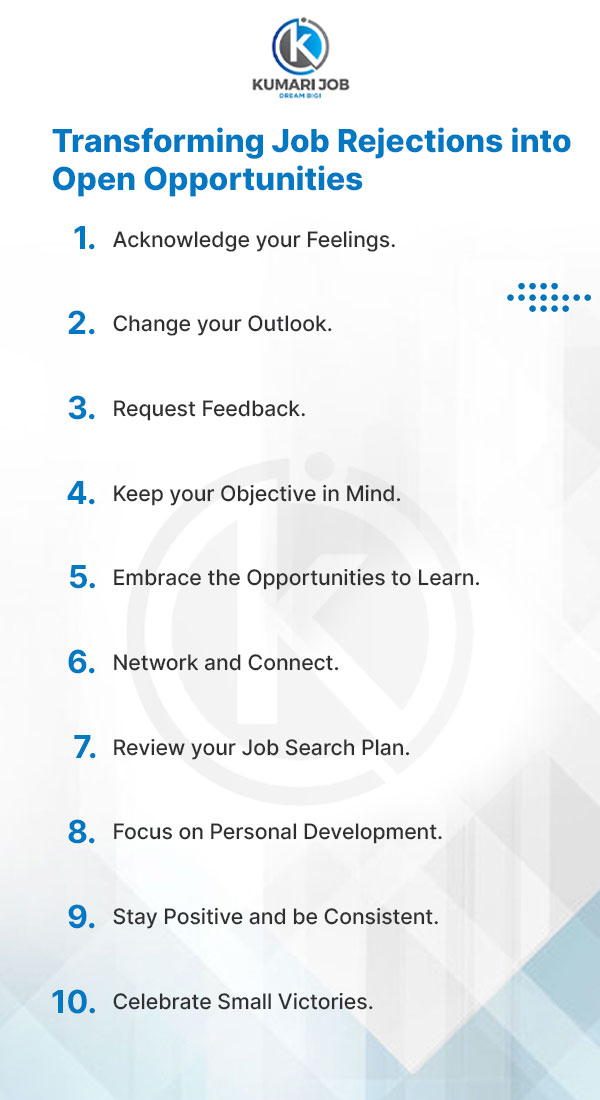
The journey to fulfillment is rarely without challenges. Rejection from a job is a difficult obstacle to overcome. However, it is important to understand that rejection is not the end of the road. It may be the beginning of a new path filled with opportunities for growth and success. This blog aims to delve into how to deal with job rejections, embrace change, and ultimately turn challenges into stepping stones in helping oneself to create opportunities.
In this blog
- Understanding Rejections
- Navigating Job Rejection with Professionalism and Positivity
- Navigating the Emotional Terrain
- From Rejection to Resilience
- The Power of Adaptation: Turning Rejection into Opportunities
- Empowerment Through Knowledge: What to Do After a Job Rejection
- Conclusion
- Frequently Asked Questions
Let's examine the potential causes of not landing a job after an interview before going into what we should do if we are rejected.
1. Inappropriate or Untidy Appearances
Making a great first impression with a well-ironed suit and a polished appearance is certainly important, but it's also essential to take into account the particular culture and policies of the organization. If the workplace has a casual dress code, arriving in a suit may unintentionally suggest that you are out of step with the culture. It's crucial to investigate the business in advance and modify your wardrobe accordingly. This shows that you are aware of and respectful of their culture, which speaks well of your flexibility and attention to detail. In such a situation, dressing in business-casual attire that supports the company's culture would be more appropriate. Doing so demonstrates your ability to easily fit into any environment and create a favorable initial impression.
2. Lack of Good Communication Skills
It's important to remember that communication doesn't always involve spoken interactions; you can also express information using your body language. More effective interaction includes actively listening, understanding and responding correctly. To communicate your message accurately, non-verbal clues like gestures, facial expressions, and tone of voice are also very important. This broad method of communication guarantees that information is transmitted precisely and completely, promoting understanding among participants and productive dialogue.
3. Early Discussion or Questions About Salary/Benefits dealing with rejection
Focus on connecting with the interviewer and showcasing your qualifications. Discussing pay and benefits too soon might show that money is your major focus rather than your qualifications for the position and the company's objective. Save these discussions for later when you can better express your worth and learn more about the role. By strategically matching your skills to the demands of the position, you come across as a sincere candidate eager to contribute to the company's success.
4. Unrealistic Career Goals and Job Expectations
Imagine a scenario in which you are just starting in the marketing field and declare that your dream job would be Chief Marketing Officer of a major corporation. Despite being praised for being ambitious, this situation is impractical and could even be unrealistic. When applying for a job, matching your professional aspirations with the organization's objectives and establishing employment expectations after researching industry norms is vital.
5. Under or Overqualified, Exaggerating Experience
Knowing your surroundings and industry demands before setting foot in anything is always advised. Are you qualified for the position based on your experience? If you don't, the recruiter will reject your application. And if you decide to falsify your résumé, it will haunt you. On all shortlisted individuals, recruiters do background checks to look for irregularities in education and experience. You may forget about getting a job with that recruiter once your fraud is discovered.
In job interviews, it is crucial to present oneself honestly and correctly. But occasionally, candidates unintentionally damage their chances. Rejection can arise from being overqualified or underqualified for a post, indicating a possible mismatch between abilities and job requirements. Exaggerating one's experience might also have similar outcomes. These lies are frequently exposed throughout the recruiting process, which damages confidence and trust. It is crucial to approach the application and interview process with transparency and integrity to ensure that qualifications are correctly matched with the desired function. This establishes trust between the applicant and the prospective employer, building a solid base for a successful professional relationship.
Understanding Rejections
“It is during our darkest moments that we must focus to see the light." -Aristotle.
Even the most talented people have encountered rejection throughout the job-hunting process. It's essential to recognize that this is not an isolated journey; countless others have travelled parallel roads. These setbacks align abilities and objectives with a specific function rather than a personal shortcoming. Like a puzzle, the ideal fit depends on compliance across several dimensions. Rejection may be a stepping stone for growth and the opportunity to alter one's course. Remember that every rejection is a push toward a better opportunity that is waiting. These are the times when character, resiliency, and actual potential are developed. A relationship where both the individual and the organization grow will happen with patience and time. Let rejection serve as a moment of self-compassion and a reminder of how to handle rejection, that this is a well-traveled journey, and that better days are ahead.
Navigating Job Rejection with Professionalism and Positivity
Let's say you've received a job rejection letter. Remember, handling job interviews and dealing with rejection in a job interview call for a blend of professionalism and resilience. Feeling disappointed is natural, but maintaining a positive attitude is crucial. Thank the employer for the interview opportunity and express your interest in the company. Enquire if there's any feedback available to help improve your future applications. Remember, a gracious response leaves a favorable impression and opens doors for potential opportunities within the company. This approach ensures that the message feels genuine and not generated by a computer program. Responding to a job rejection with this level of grace is key in effectively showing how to handle job interviews and deal with rejection in interview situations.
Navigating the Emotional Terrain
1. Processing emotions:
Dealing with professional rejection is no easy feat. Recognizing and working through your emotions when faced with job rejections is vital in turning them into opportunities. By acknowledging these feelings, you can move past the initial sting of rejection and shift from negativity to constructive self-reflection. This process cultivates a positive mindset, enabling you to view rejection as a stepping stone towards personal growth and improvement. It's the initial stride in learning how to deal with rejection.
2. Reflection and Learning:
Understanding how to accept rejection to transform job setbacks into useful chances and perfect the art of facing rejection head-on is essential. By embracing what is, we can find the route forward. After being rejected, self-reflection becomes more significant. This involves closely examining the hiring process, assessing interview performance, and determining suitability for the role and the company. Your compass is determined by what you do well and where you may improve. Rejection from a job presents an opportunity for ongoing development because it draws attention to areas that require improvement and the shifting demands of the labour market. People can develop professionally and closely match themselves with their intended career path by viewing rejection as a chance for self-reflection and progress.
3. Framing Perspectives:
Mastering how to deal with rejection involves a crucial skill, which is often called framing perspectives. By emphasizing the positive aspects of rejection, individuals can perceive it as a valuable stepping stone for personal and professional development. This shift from seeing it as a setback to an opportunity allows for exploring different approaches and tactics. Nurturing an open-minded outlook uncovers hidden insights, strengths, and potential avenues for redirection toward a more suitable path. This perspective empowers individuals to sustain their resilience and motivation, ultimately guiding them toward fresh opportunities. This is how to overcome rejection—through self-care, self-reflection, and learning from our setbacks.
From Rejection to Resilience
Getting through the job search process consistently involves rejection. Important abilities in this process include understanding how to get over rejection and handle a job rejection graciously. This trip aims to overcome obstacles while using them as a springboard for development and advancement. Three key areas will be covered in this investigation: developing inner fortitude, encouraging resilience, and developing a workable strategy. These components provide people the ability to overcome rejection and the courage and tenacity to take on new tasks.
1. Building Strength:
Strengthening oneself is key to converting job rejections into intriguing chances. Equally crucial is learning how to move forward from disappointment. Every rejection one experiences strengthens one's inner tenacity and perseverance. Bouncing back from failures like job rejections makes you emotionally stronger and develops your feeling of self-assurance. You have the opportunity to demonstrate your capacity for adaptation, tenacity, and success in the face of difficulty through these experiences. People can increase their ability to face problems in the future with poise and unyielding resolve by viewing rejection as a vehicle for personal progress. Strengthening one's character through this path enables job searchers to approach new opportunities with unmatched confidence. Consider using techniques like self-reflection, positive self-talk, looking for mentorship, and other techniques to develop this strength.
2. Cultivating Resilience:
Developing resilience is the secret to tolerating rejection and making the most of it. Resilience is overcoming obstacles, especially when faced with employment rejection. One can utilize rejection as a platform for personal development rather than allowing it to undermine one's self-esteem. Recognizing the disappointment while reframing it as a brief setback rather than a long-term failure is a step in this process. Resilience improves with each rejection experience, giving one a strong basis for maintaining attention, motivation, and resolve when seeking new opportunities. A growth mindset, self-compassion, seeking assistance and mentorship, realistic goal-setting, promoting adaptation, self-reflection, and using mindfulness and stress-reduction practices are all ways to deal with rejection. These techniques enable people to understand how to cope with rejection.
3. Crafting an Effective Plan:
Developing an effective approach is key to learning to bounce back from rejection and turn job rejections into possibilities. After processing the initial emotions and varying points of view, the next stage is developing a well-thought-out action path. A timeframe for execution, clear techniques for skill development, and well-defined targets should all be part of this approach. An efficient plan should also cover how to use rejection feedback to enhance a resume, cover letter, and interview abilities. Job seekers can concentrate their efforts on proactive measures that not only address flaws but also highlight strengths through the hard development of a plan that aligns with their own goals and adheres to standards set by the industry.
The Power of Adaptation: Turning Rejection into Opportunities
Rejection is a natural component of the dynamic world of career activities. But it's important to understand that rejection isn't considered an assessment of a person's value or potential. Instead, it works as a compass, pointing people toward jobs and settings that complement their abilities and goals. Setbacks may be used as launching pads for brand-new chances, thanks to the transforming process of adaptation. Individuals are given the ability to construct a path of endurance and self-discovery by embracing rejection as fuel for progress. In the end, this journey results in a career path that is more satisfying and motivated by purpose. Let's examine the power of adaptability and how it could influence how we react to failures in the workplace.
1. Unveiling Hidden Doors:
The section sees failure as an opening for undiscovered chances. It implies that obstacles may cause people to reevaluate their career routes and shift their attention to previously unconsidered options. People can widen their views and investigate occupations or industries they hadn't previously considered by using rejection as a guide. A job path that is more fulfilling and congruent results from this viewpoint. Additionally, several strategies are given for how to deal with rejection and uncovering these untapped prospects, including networking, skill building, volunteer work, following market trends, and registering for professional development courses.
2. Networking's Role:
To effectively network, you must develop sincere connections with people who share your values to create opportunities to benefit your career. The importance of networking is based on several important elements. Initially, it gives access to a wider selection of options, such as employment vacancies, clients, and speaking engagements. Interacting with individuals with various experiences and opinions also acts as a platform for learning and personal development. A network of supportive people can also be a lifeline by providing guidance and inspiration during trying times. Additionally, persistent networking raises your profile in the sector and establishes you as an expert. Attend industry events, sign up for groups, use LinkedIn for outreach, and look for chances to help others to jumpstart your networking efforts.
3. Staying Persistent:
The secret to persistence comes in approaching the job search with initiative, continually improving abilities, and changing techniques in response to criticism. Job seekers who adopt a never-give-up attitude are likelier to stick with their plans despite minor setbacks. In the end, perseverance helps people overcome obstacles, grow stronger, and be more equipped for new chances. The passage focuses on how crucial it is to be persistent in the face of employment rejections. It emphasizes that there is rarely a straight path to success and that rejections serve as a reminder of the importance of resilience in the competitive employment market. People are urged to use each rejection as fuel to keep going rather than letting failures discourage them.
Empowerment Through Knowledge: What to Do After a Job Rejection
A careful strategy is needed to navigate the aftermath of career defeats. With the help of this resource, you can turn rejection into an opportunity for your professional and personal growth. It acts as a guiding light, showing that setbacks may be converted into chances for a greater professional future by educating people with information and powerful viewpoints.
1. Practising Self-Care:
Navigating through job rejections requires understanding how to deal with rejection and formulating an effective response to job rejection. Coping with rejection and responding to job denials are crucial aspects in the grander scheme of turning job setbacks into fresh opportunities. It's important to acknowledge that dealing with rejection can take an emotional toll, underscoring the need for individuals to prioritize their mental and emotional well-being. Engaging in self-care practices like meditation, regular exercise, quality time with loved ones, and pursuing personal interests not only helps manage the stress and disappointment that often accompany rejections but also aids in maintaining a clear and balanced perspective. This self-nurturing and cultivating a positive mindset equips job seekers to better navigate the highs and lows of their job search journey. Remember, self-care isn't just a way to cope; it's a potent tool that empowers individuals with the resilience and inner strength needed to stay focused, motivated, and ultimately prepared for the new opportunities that are bound to arise.
2. Reflecting and Learning:
The passage highlights how important it is to reflect on one's progress and never stop learning to turn job rejections into possibilities. It pushes people to assess their application procedure, interview skills, and overall presentation, encouraging them to see rejection as an opportunity for insightful learning. Additionally, employment rejections are viewed as a waypoint for lifelong learning, revealing changes in industry expectations and chances for skill development. Accepting rejection as a motivator for introspection encourages both personal and professional development. By remembering these lessons, individuals may hone their approaches and position themselves as top contenders for upcoming chances. This method, founded on how to deal with rejection, paves the way for job advancement and personal growth.
Conclusion
The journey of learning how to deal with rejection in interviews and navigating through rejection situations is a testament to resilience and determination. Remembering success isn't a straightforward path but rather a series of setbacks and triumphs is crucial. By embracing job rejection as an opportunity for growth, maintaining a positive outlook, and adapting with awareness and flexibility, anyone can turn handling job rejection into a stepping stone toward new opportunities. Overcoming the challenge of dealing with job rejection might be tough, but it's important to bear in mind that the road to success is rarely easy; yet, these challenges often make the ultimate victory all the more rewarding.
Read more related articles: https://tinyurl.com/3m5kw86k.
Frequently Asked Questions
Acknowledge your feelings, allow yourself to process them, and avoid suppressing emotions. Understand that rejection is a natural part of the job search process and doesn't define your worth.
Absolutely. Rejections can redirect you to roles or industries you hadn't initially considered. Sometimes, these paths lead to even more fulfilling opportunities than the ones you pursued initially.
Absolutely. Handling rejection builds resilience, enhances problem-solving skills, and increases your capacity to adapt to change. Each rejection is an opportunity to learn and become a more well-rounded professional.
Such articles provide valuable guidance on coping strategies and next steps. They offer advice on self-care, self-assessment, and maintaining motivation, which can be instrumental in your recovery and success.
Networking maintains your connections within the industry. It can lead to referrals for other positions, informational interviews, and insights into unadvertised job openings.
Embrace your feelings, seek support, and use the experience to learn, grow, and move forward.
Remind yourself of your achievements and strengths. Keep a record of positive feedback received throughout your career. Focus on your growth and the potential for future success.











0 Comments